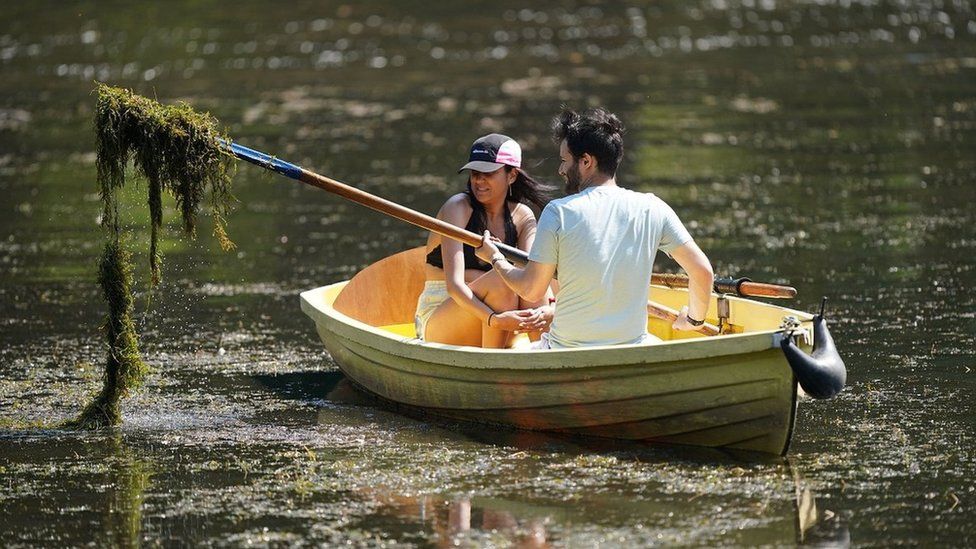ARTICLE AD BOX
 Image source, PA Media
Image source, PA Media
Temperature reached 32.2C in June and the heat was long-lasting
By Georgina Rannard & Kady Wardell
Climate & Visual Journalism
The UK's hottest June on record caused unprecedented deaths of fish in rivers and disturbed insects and plants, environment groups have warned.
Nature is being "pounded by extreme weather without a chance to recover", the Wildlife Trusts said.
The Met Office will say later on Monday if the high temperatures were linked to climate change.
People also used more water with demand increasing by 25% at peak times in some areas, said Water UK.
The Met Office said last week that provisional figures for June indicate that both the overall average and the average maximum temperatures were the highest on record.
"The reports of the number of fish death incidents in rivers for this time of year has been unprecedented. I would normally expect rivers to be affected later in the summer when it's hotter and drier," Mark Owen, from the Angling Trust, told BBC News.
In one case, sea trout were found dead on the River Wear in north-east England, he said.
The deaths are partly caused by less oxygen in the water as river levels decrease. Fish also die when dried-up pollutants from cars and lorries on roads wash into rivers during flash storms.
The Environment Agency said it received more reports of dead fish than the same time last year.
Many flowering plants, including orchids, wilted in the high temperatures, meaning insects like bees and butterflies that feed on nectar and pollen will have less to eat, Ali Morse from the Wildlife Trusts told BBC News.
Species with short lifespans are particularly badly affected. Many butterflies are adults for only a short time, and if they cannot access food in that period, it stunts the population.
These impacts are more surprising considering the wet and cold spring and are earlier than last year, Ms Morse added.
"Every month seems to be the hottest, the driest, the wettest, or whichever record-breaking event it is. If we have a one-off pollution event or a wildfire, then there is normally time for nature to bounce back, but now it seems to be continually pounded by extreme weather," she added.
More frequent and more intense periods of warm weather are putting pressure on the UK's environment and water supplies.
As temperatures rise, people also use more water in their homes. Last July and August water companies supplied 1.2 billion litres more water than the same months in 2021, according to Water UK.
People in Devon, Cornwall and parts of the south-east of England are under hosepipe bans.
Water experts say that rivers and reservoirs, which provide much of the UK's drinking water, are in a healthier position than the same time last year.
But the dry weather is likely to have an impact on water supplies and if warm weather continues, those supplies could be depleted quickly.
Water UK is urging homes and businesses to "continue to save water to help safeguard against potential future drought conditions".
People can play their part in helping nature withstand the impacts of extreme heat with small, simple actions, Ms Morse explains.
A bowl of water in a garden or yard can provide water for thirsty hedgehogs, bees and butterflies.
And longer grass is more resilient in hotter weather and gives species a much-needed habitat to live in, so she suggests letting even small areas of lawn grow taller.

 1 year ago
38
1 year ago
38








 English (US) ·
English (US) ·